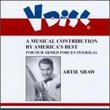| All Artists: Hermann Scherchen Title: Mahler:Syms. 1 & 2 Members Wishing: 1 Total Copies: 0 Label: Universal Music & VI Release Date: 5/7/1991 Genre: Classical Styles: Historical Periods, Modern, 20th, & 21st Century, Symphonies Number of Discs: 1 SwapaCD Credits: 1 UPC: 076732983324 |
Search - Hermann Scherchen :: Mahler:Syms. 1 & 2
 | Hermann Scherchen Mahler:Syms. 1 & 2 Genre: Classical
|
CD DetailsSimilar CDs
|
CD ReviewsScherchen's adventurous "Resurrection" L. Johan Modée | Earth | 06/30/2007 (4 out of 5 stars) "Hermann Scherchen has a fluctuating reputation among Mahlerites. Some think very highly of SOME of his interpretations (e.g., the Vienna or Toronto no. 7, and the Vienna or Leipzig no. 3), but others consider them to be too adventurous and deviant when compared with Mahler's score. This recording, however, provides one of Scherchen's best Mahler interpretations caught on a disc: the studio 1959 Vienna take of symphony no. 2. It is as adventurous as one could expect from Scherchen, but this works well with the "sense of drama" that this symphony requires in order to be really successful. Recording quality is acceptable as an early stereo take, but strings are quite weak (too few). This interpretation exist in many incarnations, most of them hard to find since they are deleted from the catalogue." Resurrection for the Ages William Michaels | Hillsborough, NJ United States | 05/14/2007 (5 out of 5 stars) "No matter how many versions of the Resurrection you have, you need this one! Despite the fact that the recording is close to a half-century old, Scherchen reveals many important details of the symphony that every other conductor I have heard, from Walter to Klemperer to Kaplan, underplays, thus oversimplifying the work. Yes--Scherchen is slow; I believe the timing runs to close to 90 minutes, 10 more than many versions. But, as with Barbirolli's 6th, I believe "slow and steady wins the race" here. Scherchen's deliberateness imparts a matchless grandeur to this masterpiece." One of these overpowering musical events, hard to forget! Hiram Gomez Pardo | Valencia, Venezuela | 03/30/2010 (5 out of 5 stars) "After having listened it carefully all the way through with its surprising orchestration details, unsuspected insights, majestic splendor, lyricism, radiant musicianship and relentless pulse, conferring it possibly one of the most original and bold approach my memory has kept, one wonders why this way of conducting has missed from the stages. It' s such the febrile vehemence, resplendent phrasing, penetrating vitality and vibrating expressiveness without mannerisms or artificial poses, that legitimately could be said we are in presence of a true historical document of inestimable value. Furthermore, I would dare to affirm that just a handful of other five recordings be capable to match with this one.
To my mind, this is one of the highest peaks along the enormous and successful discography of this consecrated conductor we have notice. The question doesn't turn around if you think it's worthy to acquire it, but if you can do without about it. A real must-have recording. " |

 Track Listings (5) - Disc #1
Track Listings (5) - Disc #1